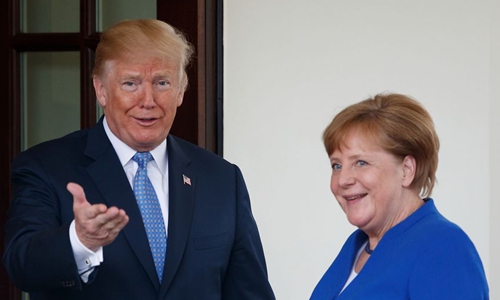US troop pullout makes Europe rethink
By He Zhigao Source:Global Times Published: 2020/6/10 19:03:40

US President Donald Trump welcomes German Chancellor Angela Merkel at the White House in Washington D.C., US, on April 27, 2018. Photo: Xinhua
Tensions between the US and Germany over military spending and other security issues are ramping up. A senior US official said on Friday that US President Donald Trump has ordered the US military to remove 9,500 soldiers from Germany. As close partners in the transatlantic alliance, Washington-Berlin ties will be negatively affected due to the proposed troop withdrawal. This may reshape the security architecture in Europe.
For a long time, Germany has viewed the North Atlantic Treaty Organization (NATO) as a security provider for the entire Europe and believes that cooperation with the US and other NATO partners is crucial to Germany's own security.
However, since Trump took office, US relations with Germany have fallen into a low ebb. Some scholars even argue that Trump is jealous of German Chancellor Angela Merkel and treats her as his systemic rival, because "Merkel represents everything Trump loathes: Globalism, multilateralism, international law," The New York Times quoted Thomas Kleine-Brockhoff, vice president of the Berlin-based German Marshall Fund of the United States, as saying on Saturday.
According to a 2019 Pew Research survey, only 13 percent of Germans have confidence in Trump; while 45 percent of them say US bases are not important for Germany's national security. Only 15 percent claim US troops are very important. According to another Pew Research survey released in March 2020, only 34 percent of Germans say US-Germany relations are good. This embodies the belief that Berlin and Washington have major divergences in bilateral ties and security policies, which have affected public opinions in the two countries.
In recent years, the number of US troops stationed in Germany has been declining dramatically, from 72,400 in 2006 to 34,500 at present. The increasingly complex global security landscape urges Washington to adjust its strategic focus. The Merkel administration is also reconsidering Germany's security and defense policies.
However, even after 9,500 US soldiers are removed from Germany, there will still be 25,000 left. Furthermore, the headquarters of the US European Command remain in Stuttgart, Germany. That being said, Berlin's strategic significance to Washington, as well as Germany's security dependence on the US and NATO, will not change in the short run.
The US' planned withdrawal of its troops from Germany has drawn mixed reactions. German Foreign Minister Heiko Maas said Germany will "take note of" US withdrawal while admitting that US-German relations were "complicated."
Germany's ruling center-right Christian Democratic Union (CDU) supports US military presence in Germany. The left-wing forces in Germany, however, generally welcome the US pullout of its troop.
Germany's ambivalence is obvious. As Berlin is catering to different domestic opinions, its reliance on NATO's collective security system will not change any time soon.
On the one hand, this is because of the intensifying divergences between Germany and NATO and the Trump administration's unilateralism, which have made Germany consider that it is time to keep the security initiative in its own hands.
On the other hand, European defense integration is advancing slowly. Europe is temporarily unable to get rid of its security dependence on the US.
The US troop withdrawal from Germany has generally aroused European countries' concerns about maintaining collective security in the region. However, the withdrawal has also led to different responses within Europe.
Polish Prime Minister Mateusz Morawiecki said on Saturday that he hoped some of the US troops removed from Germany will be reassigned to Poland. Poland regards the US as the source of its security guarantee. Poland believes that Europe lacks the ability to achieve strategic autonomy, and that NATO is the main force to deal with threats from Russia. Poland's attitude reflects the status quo of European defense integration - lacking the ability to coordinate different member states' interests and mind-sets.
Ensuring the balance of power in Europe is one of US geostrategic goals. The Trump administration is withdrawing troops from Germany while proactively establishing defense systems in Eastern Europe. This has created more divisions in Europe.
The US regards European defense integration as a strategic obstacle rather than a benefit. However, Trump's policy adjustment will make Germany step up its pace of integrating European defense mechanisms.
The author is a research fellow with the Institute of European Studies, Chinese Academy of Social Sciences. opinion@globaltimes.com.cn
Posted in: VIEWPOINT